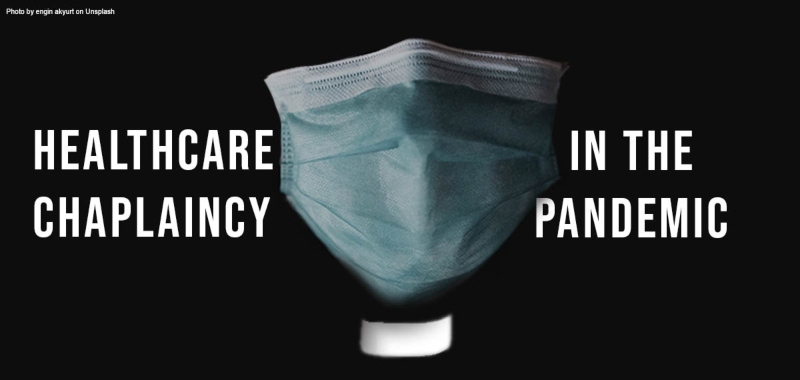Healthcare chaplaincy in a pandemic
'Most times we do visit. It is so important to the patients. Often we are the only non-medical person to see them for days, if not weeks.'
By Mark Burleigh, Head of Chaplaincy & Bereavement Services, University Hospitals of Leicester

I have been a hospital chaplain for 26 years, and the past month has been unprecedented. It has made a great difference to how we operate in the hospitals and as chaplains we have all needed to adapt to this “new normal”.
 In my role I manage two teams - the chaplains and the Bereavement Services team. Both needed to make some pretty dramatic and immediate changes to the way they work. We had to suspend our wonderful chaplaincy volunteers and stop our general visiting around ward patients, limiting our visits to specific patients we knew would benefit from a visit, either because we knew them from previous admissions or because a referral had come from the ward, family or friends.
In my role I manage two teams - the chaplains and the Bereavement Services team. Both needed to make some pretty dramatic and immediate changes to the way they work. We had to suspend our wonderful chaplaincy volunteers and stop our general visiting around ward patients, limiting our visits to specific patients we knew would benefit from a visit, either because we knew them from previous admissions or because a referral had come from the ward, family or friends.
In Bereavement Services some staff were anxious about Covid-19. Early on we had a couple of Covid-19 deaths and the doctors who had treated the patients came to the Bereavement Services office to complete the death certificates. When they sat in the office our staff were anxious that they might catch Covid-19 and take it home and infect their families. Furthermore we had to suspend families coming to collect certificates and their loved one’s property as the family needed to self-isolate because their loved one was infected.
As time has passed we have learnt to see the risk in proportion as we have become familiar with using PPE. Yet, still many NHS staff feel anxious for their families. I heard one nurse say her family would not sit near her at home even though she has changed and showered. This contributes to the stress on our staff, and as chaplains we have a role to support them.
We have had many referrals from churches, families and friends to visit patients. Where we can we will visit in person. However, we always defer to the advice of nursing staff regarding the PPE we should wear. If we are told that we should not visit the patient in person, we will do what we can, for example speak on an iPad or phone or pass a prayer to them on paper.
Most times we do visit. It is so important to the patients. Often we are the only non-medical person to see them for days, if not weeks. They are separated from family (in some cases I have visited patients whose husband or wife has died in the last few days and they were not with them). It is harrowing to see.
Yet, if I can bring some small chink of hope to the patient, though passing on messages, allowing them to talk about their loved ones, or to say a prayer of hope - it is so worthwhile. I am not an overtly emotional person, but even to write these words bring a lump to my throat. If it affects me like that, how much more it is for our dedicated ward-based staff who are immersed in this terrible scenario day after day.
As chaplains we have been trying to help support staff along with other services in the hospitals. I have been asked to pray with ward staff, lead mindfulness sessions and attend ward "huddles" where staff can talk about their feelings and wellbeing. When the immediate pressure lifts there will be a need for lots of formal and informal support - and we will play our part then, too.
So who looks after the chaplains? We have had a couple of counsellors offer to provide us with support and many of us have a spiritual director or clinical supervisor to support us.
My Christian faith also sustains me. I have always been drawn to chaplaincy, which I see as an incarnational ministry. Before being a hospital chaplain I also was a chaplain at De Montfort University for a number of years.
I do not see me as ‘taking God into the hospital’. He is already here. I do not see it as ‘ministry on the edge.’ I see it a ministry at the centre of God's working.
My ministry is to express the unconditional love and welcome of God to all, following the example of Jesus in his ministry so long ago.
I was recently asked if I am afraid, dealing at close quarters with the virus. The answer is no. I do not rush into danger - that is foolish. Rather, I trust my medical and nursing colleagues to make sure I have the right PPE and to keep me safe.
That said, I will go wherever I can to show the love of God in action.
Mark Burleigh is Head of Chaplaincy & Bereavement Services, University Hospitals of Leicester
This article first appeared on the website of the Diocese of Leicester and is republished with permission
Related
Do you have a view? Share your thoughts here.
Baptist Times, 20/05/2020